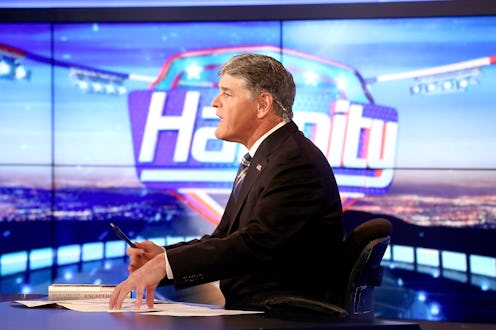News
How The Media Maybe Helped Trump Win
In the coming year, look for a spate of "Donald Trump Origin" theories to emerge. Writers, thinkers, analysts, pundits, and countless "everyday Americans" will find themselves in search of an answer as to how President Trump became a thing. And while there is plenty of blame to go around, perhaps no entity is more responsible for Trump's rise than the news media, and in particular, cable news.
In traditional myth-scribing fashion, go all the way back to the start of Trump's presidential journey, to what is known among political circles as the "invisible primary." This is the period before a candidate officially announces his/her intentions, but is working donor and media groups to build the funds and the name recognition necessary to mount a legitimate campaign. According to a study released by Harvard Kennedy School, during the 6- to 12-month invisible primary, getting regularly name-checked is the big win: "In the early going, nothing is closer to pure gold than free media exposure. It can boost a candidate’s poll standing and access to money and endorsements."
Journalists focus most of their reporting during this time on candidates who are leading the earliest polls. Whoever has the voter's attention gets newsroom buzz, too. But a curious thing happened with Trump. His number of initial supporters was abysmal, But while he lagged well behind other Republicans, The Donald still received an inordinate amount of air time.
How much free media did Trump accumulate? A staggering $2 billion worth. From the crucial "invisible primary" through his eventual vanquishing of Republican rivals, Trump managed to spend just pennies on the dollar compared to other candidates.
And the reason is simple, if no less nauseating. Donald Trump came to the political sphere with ubiquitous name recognition, a longtime presence in millions of living rooms through his NBC television show, The Apprentice.
This celebrity made him the proverbial shiny penny from the start. Then add Trump's compulsive addiction to controversy. He was the shock and awe candidate, willing to "go there" on any issue. Claim President Obama was not an American citizen; suggest Megyn Kelly's period was to blame for tough questions during a debate; call Mexicans "rapists"; open a debate by declaring that his nether regions were a "no problem" zone; blame President Bush for 9/11. Whatever, whenever, Trump spoke his unfiltered mind. And the media could not resist.
Though it took his Republican rivals a while to catch on, eventually they figured out that Trump's dominance of headlines and air time was drowning out their chances. In late February, shortly before he suspended his campaign, then-Republican presidential candidate Marco Rubio told John Dickerson as much, saying:
The media coverage of Donald Trump has almost been cheerleading over the last couple weeks and I'm convinced it's because many in the press want him to be the nominee ... One, I think they think it's going to be good for ratings, and two because they know they have a lot of material to work with.
Rubio was right on both counts. As CBS chairman, Leslie Moonves, infamously admitted, "[Donald Trump] may not be good for America, but it's damn good for CBS." This chase after the golden goose of Trump ratings sometimes reached the level of seeming satire. Networks would often stay glued on copious long shots featuring nothing more than an empty stage with a Trump podium, some faceless host narrating in the background. Amy Goodman pointed this inequity in exposure out quite poignantly:
It's tempting to blame the messengers here, but cable news talking heads don't always get to choose their program lineup. As David Folkenflik reported for NPR, "Several cable news hosts told me they felt they had lost control of their programs as executives demanded live feeds of Trump to continue to fuel increased audiences."
The charitable view is that no one involved imagined Trump could actually win. Certainly, the Clinton campaign did not anticipate his chances. Of the Republican primary possibilities, the Democrats were hoping to run against Trump. His flaws were so manifest and numerous, why on earth wouldn't they want to run against him?
So why did voters overlook Trump's deficiencies? Well, though all the Trump attention was not positive, most of it did not qualify as negative. During the early stages of the campaign, Trump's net favorable coverage far outweighed the negative. Even at a left-leaning, serious newspaper like The New York Times, 63 percent of Trump's 2015 coverage was either positive or neutral.
That's a number to dwell on. Because if ever there were a politician who earned negative stories, his name was Donald Trump. Yet it seems media outlets were cowed by the bright hope of ad revenue and bigger audiences. That should give everyone pause.
Trump's win could also be due in part to turning his supporters against the media in general, so that many of them stopped listening to reporting that didn't cast Trump in a glowing light. This was a pretty easy task, given that trust in the media has plummeted. Especially among Republicans, confidence in network news outlets has hit frightening lows, with just 32 percent saying they have "trust" towards traditional journalistic outlets. Bill Maher himself laments that too often liberals have "cried wolf" about Republicans, and now the country may not believe the warnings about Trump:
Unfortunately, Maher's worst fears just came true. With Trump now on his way to 1600 Pennsylvania Ave., get ready to be inundated with attempts at a back story for this mess. Just don't forget that one influential factor in Trump's stupefying win turns out to be the explainers themselves.
